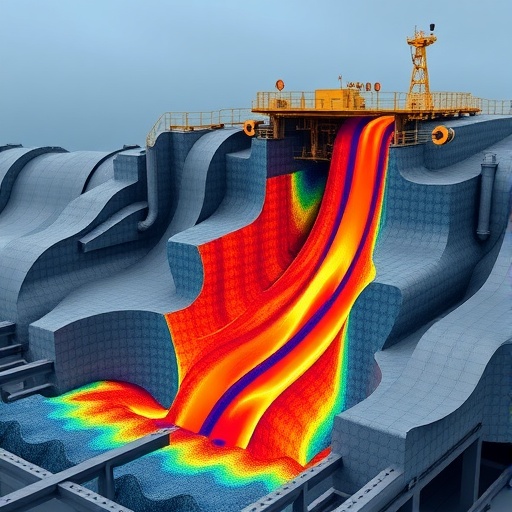In an exciting development in the realm of geological engineering and resource extraction, a recent study has unveiled a pioneering machine learning-based approach aimed at predicting the fracability of deep reservoirs. This innovative methodology, articulated by a team led by Li et al., marks a significant leap towards optimizing hydrocarbon extraction processes while ensuring environmental sustainability. The team’s research, titled “A New Machine Learning-Based Prediction Approach for the Fracability of Deep Reservoirs,” was published in a 2025 issue of Natural Resource Research, signifying an important contribution to the field.
The significance of fracability in the context of resource extraction cannot be understated. Fracability refers to the capacity of a geological formation to be fractured effectively, which is a critical factor in enhancing the flow of hydrocarbons from reservoir rocks. As global energy demands continue to rise, the efficient extraction of fossil fuels from deep reservoirs becomes paramount. This research introduces methods that not only improve extraction efficiency but also help mitigate the environmental impacts traditionally associated with hydraulic fracturing.
The application of machine learning in the assessment of geological formations represents a breakthrough in the field. By harnessing algorithms that can analyze vast datasets, researchers can discern complex patterns and relationships that are not immediately evident. The team utilized historical data, geological surveys, and real-time inputs to train their predictive models, demonstrating the potential of artificial intelligence in geology. This approach not only accelerates the analysis process but enhances the accuracy of predictions, making it an invaluable tool for energy companies.
The methodology developed by Li and colleagues encompasses various machine learning techniques, including supervised and unsupervised learning. These methods allow for the extraction of key features from geological datasets, which can include variables such as rock type, porosity, permeability, and stress conditions. By integrating these characteristics, the model can predict not only the likelihood of successful fracturing but also the optimal techniques to employ for extraction.
Moreover, the implications of this research extend beyond mere extraction efficiency. With the growing emphasis on sustainable practices in energy production, the predictive capabilities of machine learning can assist in minimizing the ecological footprint of drilling operations. By identifying less invasive techniques or pinpointing the most appropriate drilling locations, companies can reduce disruption to local ecosystems, thereby aligning with broader environmental goals.
The study discusses various case studies where the proposed model was applied, showcasing its effectiveness in real-world scenarios. These examples highlight how this machine learning approach not only simplifies the decision-making process for engineers and geologists but also enhances the overall strategy for resource extraction. By applying data-driven insights, the teams involved in these operations can make informed decisions that resonate with both economic and ecological considerations.
In the context of global geological research, the importance of accessibility in the mining and fossil fuel industries is becoming increasingly prevalent. With this in mind, the study’s authors emphasize the necessity for collaboration between data scientists and geologists. The integration of domain knowledge with cutting-edge technology is pivotal to unlocking the potential of this new predictive model. The research demonstrates that when experts from different fields come together, innovative solutions can emerge that effectively address complex challenges.
As the discourse on fossil fuel dependence intensifies, the findings of this research may catalyze a shift in how industries approach resource extraction. The blend of technology and geology paves the way for more efficient and responsible practices. The team advocates for wider adoption of machine learning techniques across the sector, further encouraging the academic community to explore overlapping interests in data science and natural resource engineering.
Additionally, there are vital economic aspects to consider as this technology continues to evolve. The identification of high-potential sites through predictive modeling can lead to substantial cost savings in exploration and extraction processes. Energy companies that adopt machine learning methodologies may find themselves at a competitive advantage, leading to increased profitability and market presence as they can optimize their operations more effectively than those relying on traditional methods.
In conclusion, the research conducted by Li et al. marks a substantial innovation in the realm of resource management. By combining machine learning strategies with geological analysis, the study provides a roadmap for a more efficient and sustainable future in energy extraction. As industries look toward integrating advanced technologies, the insights from this landmark study will undoubtedly shape the prospects of deep reservoir exploitation.
The importance of continuing research and development in this area cannot be overemphasized. As the technological landscape continues to evolve, the need for adaptive frameworks that embrace both new algorithms and sound geological principles is critical. This pioneering study sets the stage for further advancements, aligning with global trends toward sustainable practices in energy extraction and fostering a future where technology and nature can coalesce effectively.
Ultimately, as the energy sector grapples with the dual challenges of demand and sustainability, innovations like this machine learning approach can usher in a new era of resource management. The commitment of researchers, practitioners, and industry leaders to enhancing extraction methods while adhering to environmental stewardship will play a crucial role in shaping the sector’s future. The path forward is clear; combining innovation and ecological mindfulness may hold the key to harnessing Earth’s resources responsibly and effectively.
Subject of Research: Machine Learning-based Prediction of Fracability in Deep Reservoirs
Article Title: A New Machine Learning-Based Prediction Approach for the Fracability of Deep Reservoirs
Article References:
Li, P., Wang, J., Liang, W. et al. A New Machine Learning-Based Prediction Approach for the Fracability of Deep Reservoirs.
Nat Resour Res 34, 2599–2626 (2025). https://doi.org/10.1007/s11053-025-10534-6
Image Credits: AI Generated
DOI: https://doi.org/10.1007/s11053-025-10534-6
Keywords: Machine Learning, Fracability, Deep Reservoirs, Hydrocarbon Extraction, Sustainability, Predictive Modeling.




